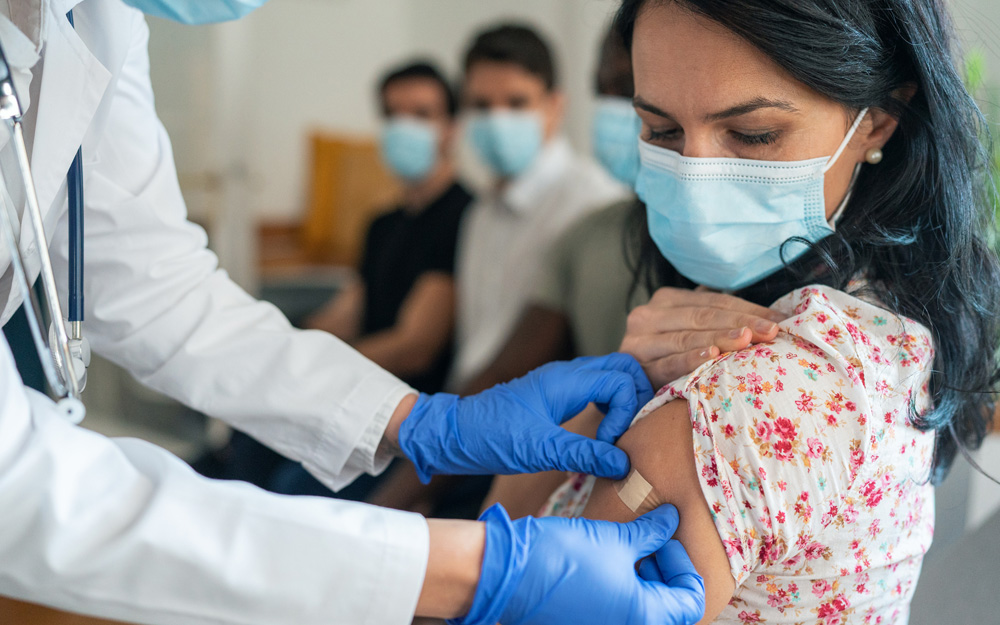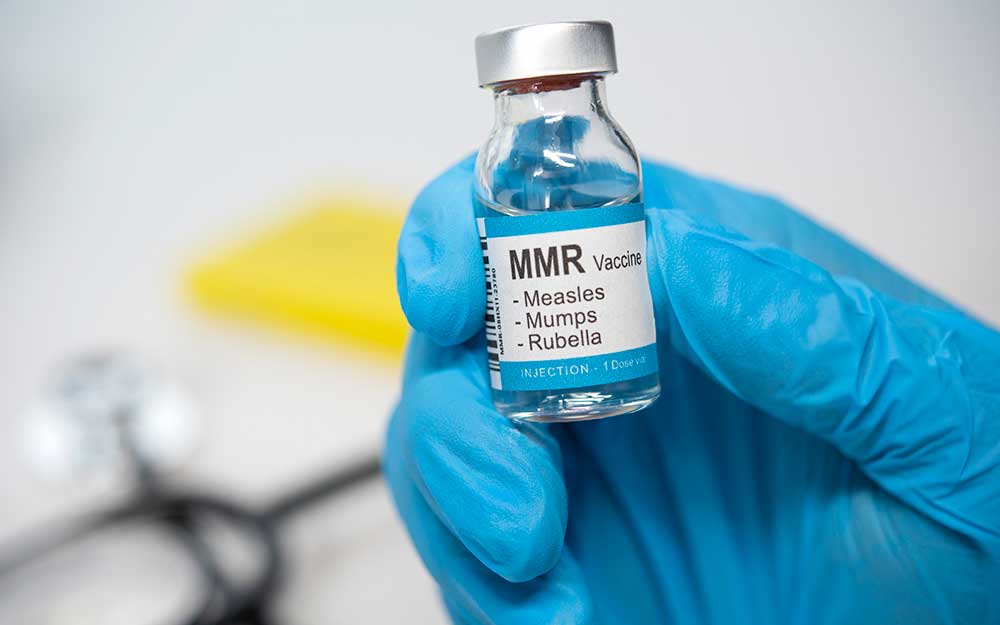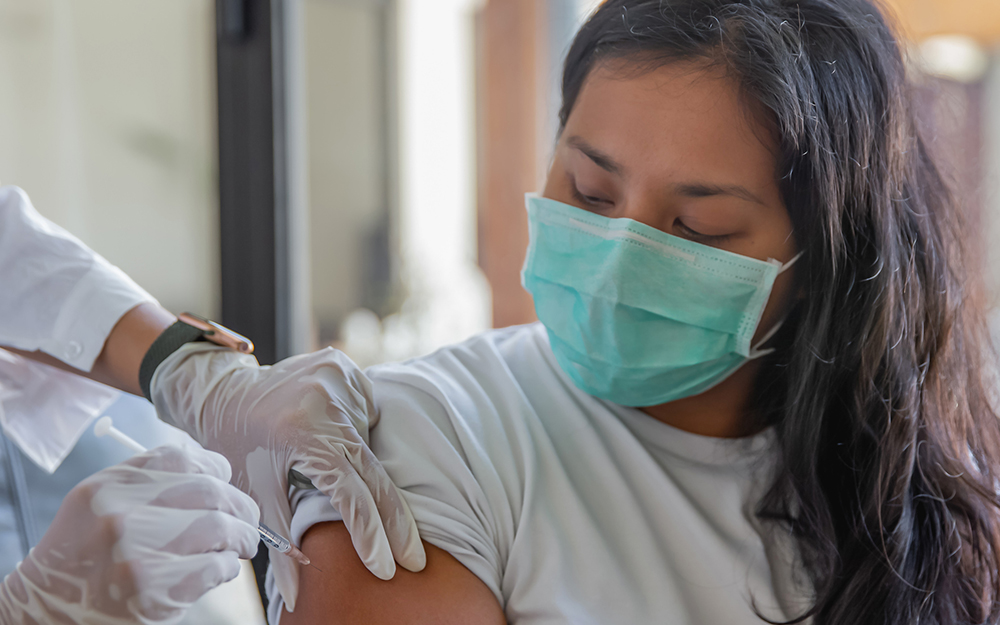Omicron Boosters and Flu Shots: What to Know This Fall
Date
October 3, 2022

Date
October 3, 2022
Credits
Medical providers featured in this article
In Brief
{{cta-block}}
In September, the Centers for Disease Control and Prevention (CDC) began recommending the first updated COVID-19 booster shots. The CDC also recommends that all persons age 6 months and older get their annual influenza vaccine, ideally before the end of October.
We asked Ethan Smith, PharmD, program coordinator of Antimicrobial Stewardship in the Pharmacy Services department at Cedars-Sinai, to answer some frequently asked questions about the updated COVID-19 booster shots—also called Omicron boosters— including whether or not you can get a COVID-19 booster and a flu shot at the same time, and how to stay up to date on your vaccinations during the fall months.
Which COVID-19 vaccine booster shot is best?
Ethan Smith: The new booster shots by Moderna and Pfizer-BioNTech both work the same way, and there’s no evidence that one of them is better than the other. As you’ve probably heard, they are called bivalent vaccines, which means they contain two messenger RNA (mRNA) parts of the coronavirus.
Half of the vaccine targets the original strain that started the pandemic back in 2020, and the other half targets the BA.4 and BA.5 subvariants of the Omicron strain. Those are the strains that are dominant right now. They account for about 90% of COVID-19 cases in the U.S., and they’re expected to stay dominant this fall and winter.
"Remember that Omicron is very contagious. If you catch it, you could pass it on even if you don’t have any symptoms, so it’s best not to get the virus in the first place."
That said, there is some data that suggests a mix-and-match approach may offer a very small advantage. If you got Pfizer for your primary series or for your last booster shot, there certainly wouldn’t be any harm in getting Moderna’s Omicron booster if you want to mix and match. But I wouldn’t specifically seek it out.
The most important thing is to get one of these boosters. Protection from your first COVID-19 shots or boosters may be fading by now, though you’re probably still protected from getting seriously sick.
Remember that Omicron is very contagious. If you catch it, you could pass it on even if you don’t have any symptoms, so it’s best not to get the virus in the first place.
Am I fully vaccinated without a booster?
ES: In healthcare settings, we don’t talk about being fully vaccinated anymore. We talk about being "up to date" on your COVID-19 vaccination. That means having at least one booster shot on top of the primary series.
In California, healthcare workers aren’t considered up to date and can’t work in a healthcare setting without a booster. Other places such as businesses, restaurants or schools may have their own rules. You can avoid any confusion by making sure you get an Omicron-specific booster. You’ll definitely be considered up to date on your COVID-19 vaccination then.
Boosters aren’t unique to COVID-19 vaccination. They’re commonly used to strengthen immunity.
Can I get the flu shot and COVID-19 booster at the same time?
ES: Absolutely! It’s both safe and smart.
These are important vaccinations. COVID-19 has been such a big part of our lives for the past two years that it’s easy to forget that influenza makes a lot of people really sick every year and can be fatal for anyone who is vulnerable because they’re older or have a medical condition. Help protect them and yourself by getting your flu shot, and get that Omicron booster out of the way, too.
You can combine the Omicron booster with other immunizations, too. One possible exception: the JYNNEOS vaccine against monkeypox. Adolescent and young adult males may want to wait four weeks between getting a monkeypox vaccine and getting any COVID-19 shot, due to the very small risk of myocarditis.
How were the Omicron boosters tested?
ES: Half the vaccine is made up of the original shot, which is still in use, has gone through extensive testing and has been given to tens of millions of people. We know it’s safe.
The other half targets the BA.4 and BA.5 strains of the Omicron variant. It wasn’t tested in humans, but regulators had a lot of data from human trials for a similar reformulation that was aimed at an earlier version of Omicron, BA.1.
That vaccine was proven to be safe and effective in humans, and it’s so similar to the updated boosters that we can confidently say they’re just as safe. The side effects of the two boosters are similar, too.
What’s more, in the BA.1 vaccine studies, participants developed strong protection against Omicron, showing that the reformulated boosters make a real difference.
This approach to updating vaccines isn’t new, either. The flu shot has to be reformulated each year, but there is no time to go through lengthy human trials every time. Regulators can rely on data from earlier studies to confirm the shots are safe because the basic formula of the vaccine is the same.
Where can I get an updated COVID-19 booster shot that protects against the Omicron variant?
ES: The Omicron boosters made by Pfizer and Moderna are available at most pharmacies and in many clinics and county sites.
If you’ve already had a primary vaccine series (two shots of the original Pfizer or Moderna vaccine, or one dose of Johnson & Johnson or Novavax), you are at least 18 years old, and your last booster or other COVID-19 shot was at least two months ago, you’re eligible for these new boosters. You can be as young as 12 to get the one made by Pfizer.
You can find a location near you by using California’s My Turn website. Los Angeles County also has a website with lots of information about the COVID-19 vaccines, including walk-in sites, FAQs, fact sheets and more.
I hear the Omicron boosters may be authorized for kids younger than 12 years old soon. Should I wait, or should my child get the Pfizer booster now?
ES: With children back in the classroom this fall and with an increase in indoor activities and events, it makes sense to get boosted sooner rather than later.
The Omicron booster made by Pfizer is available for kids as young as 12, while the Moderna version is only for adults who are at least 18 years old. It’s a good idea for children ages 12-18 years old to get the Pfizer booster now, but parents and guardians should check with their provider to discuss their individual situation.





